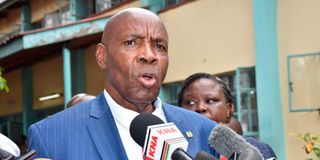Cheating in exams is also graft, mirrors our society

Education Cabinet Secretary Ezekiel Machogu. Our national exams have suffered attempts at cheating or leakage. These are allegedly thwarted by the Education Ministry, mainly by disallowing phones at exam centres and altering release times for papers.
Society ought to strive for the best interest of children; facilitating examination cheating is nowhere close to that. It’s like playing Russian roulette with their lives. Corruption is as old as the Bible.
Esau sold his birthright for a sumptuous meal of beans, Judas Iscariot betrayed Jesus for 30 pieces of silver and Samson revealed the secret of his strength to Delilah for love.
Our national exams have suffered attempts at cheating or leakage. These are allegedly thwarted by the Education Ministry, mainly by disallowing phones at exam centres and altering release times for papers. Suspects have been arrested for impersonating candidates or distributing fake or real papers.
Some errant candidates blame their act on pressure to pass the exams mounted on them by their families as the only route out of poverty. Not so long ago, Kenyans were shamed for aiding and abetting cheating in thesis writing for college students globally. Clearly, an apple falls close to a tree.
The exam cheating threat is real and has, indeed, visited our doorsteps before. Humanity has a call to protect its children, especially during these vulnerable times. We can guide children not to blindly walk from their cradles to their academic graves.
Exam cheating will expose our delinquent children to the wrong side of the law. Data from 2019 indicate that 1.2 per cent of the prison population of 53,304 comprised children. However, children do not deserve to be robbed of their youth in prison.
Priority ought to be granted to counsel and mould such children in light of the best interests of the child under the United Nations Convention on the Rights of the Child (UNCRC). This involves evaluation and balancing of “all elements necessary to make a decision in a specific situation for a specific individual or group of children”.
First, elements like care, protection and safety of the child and, secondly, the rights and needs with regard to health and education are specifically relevant. Robust public awareness campaigns in schools against cheating ought to be rolled out aggressively.
Extreme measures
In 2018, Algeria and Iraq took extreme measures of shutting down the internet connection in their countries to stop exam cheating in schools. From a human rights lens, shutting down digital communication often disproportionately inconveniences marginalised and vulnerable groups, cripples the local economy and creates cascades of chaos.
According to the Algerian Education minister, the internet would be blocked for two hours every morning as students sit for baccalaureate tests. That was after papers for the mandatory high school exams were leaked and shared widely on social media. Mobile phone jammers, metal detectors and surveillance cameras were installed at 2,000 exam centres.
On self-reflection as Kenyans, we can admit that incidents like exam cheating mirror our society.
Mr Ayuo is the founder, the African Association of Data Privacy Professionals. [email protected].




